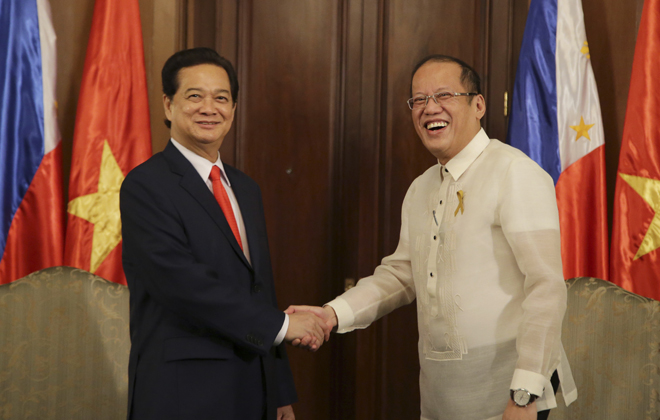Vietnam and Philippines agree to oppose China

Philippine President Benigno Aquino III, right, greets Vietnamese Prime Minister Nguyen Tan Dung during his courtesy call at the Malacanang Presidential Palace in Manila, Philippines Wednesday, May 21, 2014. (AP Photo/Aaron Favila,POOL)
MANILA, Philippines >> Vietnam and the Philippines will jointly oppose "illegal" Chinese actions in the South China Sea, Vietnam’s prime minster said Wednesday in a rare show of public solidarity between two Southeast Asian nations wrestling with Beijing’s determination to assert its sovereignty claims in the disputed waters.
Prime Minister Nguyen Tan Dung, standing beside President Benigno Aquino III after they held talks in Manila, called on the world to condemn China for causing what he called an "extremely dangerous" situation in the South China Sea by deploying an oil rig near an island that both Vietnam and China claim.
China claims nearly all of the South China Sea, putting it into conflict with Vietnam and the Philippines, which have rival claims.
The "president and I shared deep concern over the current extremely dangerous situation caused by China’s many actions that violate international law," Dung told a news conference.
"The two sides are determined to oppose China’s violations and call on countries and the international community to continue strongly condemning China and demanding China to immediately end the above said violations," he said.
The Philippines, a U.S. treaty ally, has been more vocal in opposing China than Vietnam, which has been trying to quietly resolve its territorial dispute with Beijing using ties between the two country’s Communist parties. But Hanoi was incensed by the deployment of the oil rig on May 1, leading to speculation it would shift its approach.
Don't miss out on what's happening!
Stay in touch with breaking news, as it happens, conveniently in your email inbox. It's FREE!
Last year, the Philippines filed a case against the Chinese claims at a U.N. tribunal, to Beijing’s displeasure.
Analysts have said Vietnam might now file its own appeal or join Manila’s legal challenge against China.
The Philippines took the legal step after exhausting other peaceful means to resolve its territorial disputes with China, Foreign Secretary Albert del Rosario said.
"I think Vietnam should make an assessment as to whether resorting to legal means is promotive of their national interest," del Rosario said.
The deployment of the oil rig has led to the most serious outbreak of tensions in the South China Sea in years.
Vietnam dispatched ships to confront the Chinese oil rig that have jostled with Chinese vessels defending it. Last week rioting broke out in Vietnam that killed at least two Chinese workers and wounded more than 100 others.
Aquino did not mention the territorial disputes with China when he and Dung faced journalists but said they discussed how their countries could enhance defense and economic ties, adding that both governments aim to double two-way trade to $3 billion in two years. The two countries are now considering raising their ties to a "strategic partnership."
"In defense and security, we discussed how we can enhance confidence-building, our defense capabilities and inter-operability in addressing security challenges," Aquino said.
China and the Philippines are in a standoff over another South China Sea reef, the Second Thomas Shoal. Chinese coast guard ships have thrice attempted to block Filipino vessels delivering new military personnel and food supplies to Philippine marines keeping watch on the disputed area on board a long-grounded ship.
Many have feared the long-seething territorial disputes in the resource-rich South China Sea could spark Asia’s next major armed conflict. Brunei, Malaysia and Taiwan also have overlapping territorial claims in the strategic area, but the disputes between China, on the one hand, and Vietnam and the Philippines, on the other, have particularly flared in recent years.
China has steadfastly said that virtually the entire South China Sea has belonged to it since ancient times.
Chinese maritime surveillance ships took effective control of Scarborough Shoal off the northwestern Philippines after Filipino government vessels withdrew from the disputed fishing ground two years ago. Alarmed by China’s move, the Philippines challenged the legality of Beijing’s vast territorial claims in the South China Sea before an international arbitration tribunal last year.



